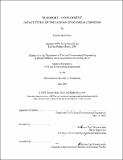| dc.contributor.advisor | Fred Moavenzadeh. | en_US |
| dc.contributor.author | Gest, Patrick-Henri (Patrick-Henri Gerard), 1977- | en_US |
| dc.contributor.other | Massachusetts Institute of Technology. Dept. of Civil and Environmental Engineering. | en_US |
| dc.date.accessioned | 2009-10-01T16:02:02Z | |
| dc.date.available | 2009-10-01T16:02:02Z | |
| dc.date.copyright | 2001 | en_US |
| dc.date.issued | 2001 | en_US |
| dc.identifier.uri | http://hdl.handle.net/1721.1/47908 | |
| dc.description | Thesis (S.M.)--Massachusetts Institute of Technology, Dept. of Civil and Environmental Engineering, 2001. | en_US |
| dc.description | Includes bibliographical references (leaves 134-135). | en_US |
| dc.description.abstract | Large-scale transport infrastructure projects are designed to enhance the rate of economic growth and income distribution of regions they link. They are often constrained by various social, economic, environmental and financial considerations. Projects are usually evaluated by economic and financial cost -benefit analysis obtained by a typical cash-flow study. This approach makes projects' appraisal deficient because it does not involve multifactor impacts of the projects. Those impacts that are not included in cost-benefit analysis are referred to as socio-economic effects. In the framework of the trans-European high-speed railway network, this thesis focuses on the London-Stockholm corridor that is only partially completed. Nowadays, one of the European Union's main objectives is a proper socio-economic integration of the different regions between themselves in order to foster regional development and sustainable mobility. Large-scale infrastructure effects on regional development and evaluation methods of such effects are analyzed to study the importance of socio-economic impacts. In megaprojects' evaluation, socio-economic impacts are no longer negligible in comparison to the financial benefits. Furthermore socio-economic impacts drive regional development and thus are the essential justification for implementing the infrastructure. Researchers are beginning to suggest that mega-projects should tend first to maximize the socio-economic benefits and second to being sound and profitable. The implication would be that governments should pay more attention to maximizing the socio-economic impacts and environmental standards and delegate to the private sector the task of making the projects profitable on a financial analysis basis. | en_US |
| dc.description.statementofresponsibility | by Patrick-Henri Gest. | en_US |
| dc.format.extent | 135 leaves | en_US |
| dc.language.iso | eng | en_US |
| dc.publisher | Massachusetts Institute of Technology | en_US |
| dc.rights | M.I.T. theses are protected by
copyright. They may be viewed from this source for any purpose, but
reproduction or distribution in any format is prohibited without written
permission. See provided URL for inquiries about permission. | en_US |
| dc.rights.uri | http://dspace.mit.edu/handle/1721.1/7582 | en_US |
| dc.subject | Civil and Environmental Engineering. | en_US |
| dc.title | Transport-- development : impact study of the London-Stockholm Corridor | en_US |
| dc.type | Thesis | en_US |
| dc.description.degree | S.M. | en_US |
| dc.contributor.department | Massachusetts Institute of Technology. Department of Civil and Environmental Engineering | |
| dc.identifier.oclc | 49393768 | en_US |
